- Home
- Susan Hill
The Shadows in the Street
The Shadows in the Street Read online
Page 1
One
Leslie Blade stopped in the overhang of the college entrance to put up his umbrella.
Rain. Rain morning and evening since the beginning of the week.
He could drive to work, but it was only a couple of miles so he didn’t qualify for a college parking permit. He could get a bus, but they were infrequent and unreliable and there was still a ten-minute walk from the stop nearest to his house.
People were dashing down the steps and out into the downpour. Students crossed the courtyard with anorak hoods pulled over their heads.
Leslie Blade lifted his umbrella and stepped out.
Until the last few months he had always followed the same route along the main road and around by the Hill, but now the Old Market Lanes had opened he sometimes walked through them, liking the cobbles and the less garish lights, looking into the windows of the bookshop and a couple of galleries, buying a piece of cheese or some salami from the delicatessen which stayed open until seven. It made him twenty minutes or more later arriving home, which his mother did not like, so he had taken to buying her some chocolate or a bag of butter toffee. It was a bribe, and it wasn’t what she really wanted, which was his company, but it worked. She enjoyed the sweets.
By the time he reached the Lanes this evening, rain was sluicing off the gutters and there were deep puddles at the side of the narrow cobbled way. The deli was closing early.
He saw her at the end of the Street, where the Lanes decanted onto the market square. She was standing just inside the light that spilled out from the pub, the collar of her jacket up, trying to shelter from the rain but still remain visible. Leslie quickened his step. This was a new place; he had not seen any of them here before. It was too near the main shopping streets and cars were not allowed to stop in the square – only buses, and taxis on their way to the rank at the far end.
But it was Abi. He was sure it was Abi, even from the other end of the street. Abi or just possibly Marie?
He skirted one puddle but hit the next and felt the cold water slosh up the front of his leg, soaking his trousers, and he almost fell as he reached the corner.
‘Abi?’
The young woman did not glance round, but instead went to join the man for whom she had clearly been waiting. Took his arm. Went into the pub.
Not Abi. Not Marie. Not one of them after all.
Leslie felt angry and he felt a fool. But there was no one to notice.
He crossed the market square and headed away from the shops and the lights, towards the Hill.
Hilary, his mother’s carer, left at four thirty and he tried to get home just after six. Tonight, it was nearer twenty past because the rain driving into his path had slowed him down. It was Thursday, one of his two nights for going out, but if it didn’t clear up, he wondered, was there much point? Would any of them be out in weather like this?
He opened the front door.
Hilary always left the porch light on for him, the kettle filled and ready. If he wanted her to do anything else, peel potatoes or put something into a low oven, he had only to leave a note and she would do it willingly, though he rarely made any requests. She was his mother’s carer, not a domestic help. He and Hilary almost never met, but communicated, if they needed to, by a series of notes – hers always cheerful and decorated with funny faces and little pencilled stars or flowers. He was lucky. He had heard stories of the other sort of carer – the Chief Librarian’s secretary had had a few bad experiences with her mother’s carers, women who had been brusque or even downright unkind, and one who had been a thief. Hilary was dependable, strong, cheerful, reliable. Leslie knew good luck when it came his way. Norah Blade was not difficult, but rheumatoid arthritis as bad as hers did not make for an even temper.
‘Leslie?’
‘I’m here. But I’m going up to change, I’m soaked. ’
‘It’s poured all day, I’ve watched it through these windows and it hasn’t let up since you went out this morning. ’
He could tell everything by her tone of voice. Good day. Bad day. Painful day. She sounded bright. Not a bad day then.
They could have a nice evening, and she’d be settled in bed before he had to go out. Sometimes, if she was in a lot of pain, he had to stay up with her, play a game of cards, help to make the night a bit shorter. On those evenings he couldn’t go.
The strip light was on above the kitchen worktops, a pan of peeled carrots on the cooker, a chirpy note from Hilary on the pad. He felt better for dry trousers and his slippers, poured himself a lager and checked on the casserole. The curtains were not yet drawn and, as he reached up to close them, he saw that the rain was no longer teeming down the windows and the wind had dropped.
‘There’s nothing much on,’ Norah said, after they had eaten supper and he had helped her back to her chair.
She watched quiz games, wildlife and travel programmes, Midsomer Murders and reruns of the gentler comedy series.
‘University Challenge?’
‘They all look so scruffy. ’
‘Goodness, Mother, you should see some of our students. The ones on television are quite presentable. ’
‘There was a boy with green hair. ’
‘That was years ago. ’
‘All the same. ’
They could continue bantering enjoyably in this way on and off until bedtime. It had taken Leslie some years to understand that Norah pretended to be grumpy and dissatisfied about small things – television programmes, the noise the neighbours made, bits and pieces in the local paper – as a safety valve. She was in continuous pain, she was limited in movement, confined to a couple of rooms, and about those things she never complained. Grumbling over the scruffiness of the young on TV was a way of letting out a scream of anguish and misery at her condition.
So he indulged her, let her grumble on. The actor who played the young detective in Midsomer Murders wasn’t as good as his predecessor; some of the wildlife programmes had too much chat from presenters and too little focus on the animals. He was used to it. He didn’t mind.
‘Hilary’s sister is expecting a baby, did I tell you?’
‘You did. When’s it due?’
‘Spring sometime. Ages yet. But of course Hilary’s thrilled to bits. They live only a few streets away from her. ’
‘Yes, you said. ’
Norah Blade never spoke a word against her carer and had never fallen out with her, even over something trivial.
They watched half of a vulgar new sitcom before Norah decided to go to bed.
‘I’ve got three new library books Hilary changed for me. They can’t be worse entertainment than this. ’ She snapped the remote control button and the television died.
It was half past nine by the time she was settled. Leslie went into the kitchen and opened the window. He could see a few stars in the clearing sky. He cleared away the supper plates, then took out a fresh sliced loaf, cheese, tomatoes and a pack of ham, made the sandwiches, cut a bought fruit cake into slices and wrapped everything in foil. He put the food into a carrier bag, with half a dozen Mars bars, some apples and a flask of coffee. He always made enough for four, and if there were more, they had to share it.
He sometimes wondered if Hilary ever saw the large blocks of cheese and packs of butter in the fridge, the chocolate and biscuits in the cupboard, and wondered who ate so much food, and usually overnight; but his mother always said one of the best things about Hilary was that she was never nosy, never commented, waited to be told things and if she was not, did not ask.
He tidied up, then watched the news headlines. When he switched off the television, the house was very quiet. A car went pa
st. Quiet again. They were at the end of the row, and the neighbours on the other side made little noise. He wondered if Norah might prefer to live in a livelier street, with more families passing by, children going to and from school; she spent a lot of time in her chair by the window. But she had lived in this house for fifty-three years. It had been his home all his life. There was no question of moving now.
The front room, which had once been the dining room, had been made into a bedroom, now that Norah could no longer climb the stairs; there was a bathroom in a small extension. He went into the hall. There was no light coming from under her door, but he called her name softly a couple of times. Waited. Nothing. He opened the door slightly and stood listening to her soft breathing. The numbers glowed a strange alien green on her radio clock.
‘Goodnight, Mother. ’
She did not reply.
But ten minutes later, hearing the soft click of the front door closing, Norah Blade opened her eyes. The house was settling back into itself. She listened. Leslie parked his car on the small piece of waste ground between their house and the block of flats. Sometimes she asked him why he bothered to keep it, whether it wasn’t too much of an expense, as he didn’t use it for work.
‘I take you to the hospital, I use it for shopping, we go out in the summer. You’d miss it. ’
‘You could hire one. ’
‘No, once you stop driving regularly you lose the skill. ’
But he used it more often than that, Norah knew; he took the car at night, twice a week, though where he went and what he did she did not know nor would she ever ask. He was a grown man. He had a right to a private life. She felt guilty enough.
She strained her ears waiting until she heard him drive away down the road. The pain was never bad during this early part of the night because she was warm and comfortable propped on her special pillows, and the medication she took with a hot drink blurred the sharp edges for a time. But she never slept until Leslie came in, just lay in the darkness, strangely comforted by the green glow of the bedside clock. He would be out for a couple of hours and when she heard him return, she would fall asleep at once, until the pain and the stiffness in her limbs woke her again in the early hours.
Two
Abi Righton pulled the sleeping bag further up round Frankie’s neck. He mumbled and chewed his lips for a moment, but did not wake. Next to him in the camp bed against the wall, his sister Mia coughed, stirred, coughed again and opened her eyes.
‘It’s OK, go back to sleep. ’
The child coughed again and struggled to sit up. They were in sleeping bags because Abi thought they were safer and warmer, and because apart from a large knitted blanket she didn’t have any other bedclothes for them.
She sat at the mirror that hung from a nail on the wall, stretching her eye from the outer corner to get the black liner round, trying to look only at what she was doing and not at her own face, the sepia shadows under her eyes, the crack in the corner of her mouth where a cold sore had just dried.
Mia coughed again and started to whimper. Abi didn’t have any cough medicine but there was some orange drink at the bottom of the plastic bottle; she could tell Hayley to give her that warmed up if Mia coughed too much. Where was Hayley, anyway? It was ten past nine, she was supposed to come at nine, that was always the arrangement. Three nights, Hayley came here to stay with Abi’s two; and three nights, Abi took them to Hayley’s. She couldn’t go out until Hayley had arrived, that was a given. Leaving their kids alone was something they had both said they would never do. That was how the arrangement had started, over a year ago. She turned her head and started on the other eye. At least it had stopped raining. Rain was the worst, though the bitter cold last winter had been something else – she’d had flu and then a cough she couldn’t get rid of for weeks, Frankie and Mia had been ill on and off the whole time and she hadn’t been able to afford the gas fire more than a couple of hours a day. That had been her rock bottom. If she hadn’t had Hayley she wouldn’t have got through it. They had kept one another going, and if one of them had money they’d help each other out that way too. Once or twice they’d stayed here, all the kids sleeping together, she and Hayley next to them, for warmth. It was like being kids themselves again. One night they’d had no money for the meters, so Hayley had gone over to the Catholic church and nicked a couple of candles from the stand. They’d lit them and talked about ghosts with the light flickering up the walls. They’d wet themselves laughing, woken the kids, made jam sandwiches with the last of the loaf.
I was happy, Abi thought suddenly, putting down the eyeliner. That was what it was. It was being happy.
She heard Hayley coming down the steps. If they could just be like that, have a laugh, be with their kids all together and not go out. Not go out ever again. Only, she had to go out, she was saving. Her savings were in an old biscuit box and every time she looked into it they’d grown a bit. Not enough. But a bit. She thought three years, maybe four, the kids would be in school, and she’d have enough to move into somewhere else or maybe her name would have come up for a house – either way she could get something better than this.
Four years, maybe five. Then not go out ever again. Not once.
‘Hiya. ’
Hayley came through the door and Mia started up coughing.
‘Thought you’d got lost. ’
‘He was sick. ’
‘Oh bloody hell, you haven’t brought him sick, have you? He’ll give it to mine, and that’s all I need. ’
Hayley stood in her jeans and parka, holding Liam by the hand. He was the colour of wax.
‘Well, you’ve got to go out, what else was I supposed to do?’
‘OK, OK. Only maybe put him over there. Put him on the other side. ’
‘Make it sound like he’s got fu**ing mad cow disease or something. He can’t help it, you know. ’
Hayley muttered on, dumping Liam on the old sofa up against the window, pulling off her jacket.
‘Anyway, it’s stopped raining. Can’t be bad. ’
‘My luck, it’ll start again five minutes after I get out. And I ran out of tea bags. ’
‘Great. ’
‘If I’m quiet I’ll go to the all-night, get some. There’s a bit of milk. ’
Abi got her fleece from over the chair back, checked the pocket for her mobile. It wanted topping up, and she didn’t have enough cash for that either. Another reason she had to go out. You could do without a lot before you did without the phone. The lifeline.
‘Lend us your mobile, Hayles. ’
‘No way. What’s wrong with your own?’
‘Nearly out. Go on, I’ll leave mine here, there’d be enough on it to call an ambulance or something if you had to. ’
‘Same goes for you then. ’
Hayley stared her out. When she was in this mood, it was best to leave her. Jump down your throat, yell, bang her head on the walls, chuck something at you, all of that, it happened, and they both knew why. Abi wasn’t risking it when all the kids were here with her.

 Mrs De Winter
Mrs De Winter A Question of Identity
A Question of Identity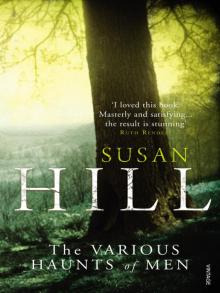 The Various Haunts of Men
The Various Haunts of Men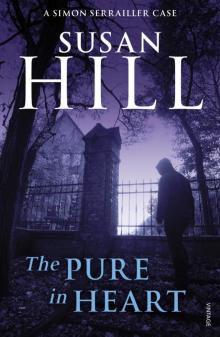 The Pure in Heart
The Pure in Heart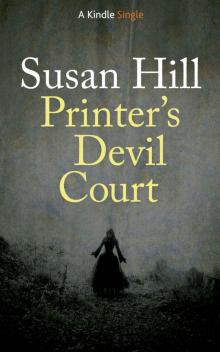 Printer's Devil Court
Printer's Devil Court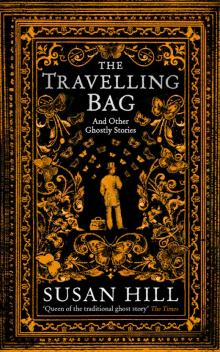 The Travelling Bag
The Travelling Bag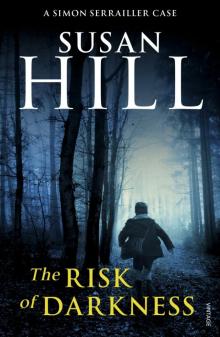 The Risk of Darkness
The Risk of Darkness A Kind Man
A Kind Man Black Sheep
Black Sheep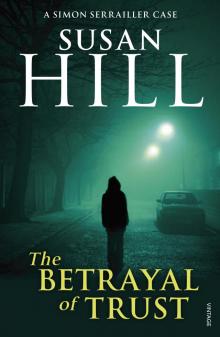 The Betrayal of Trust
The Betrayal of Trust The Service of Clouds
The Service of Clouds Betrayal of Trust
Betrayal of Trust The Small Hand
The Small Hand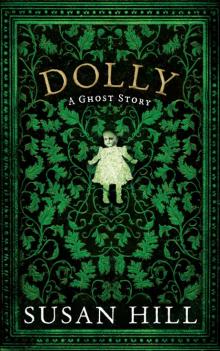 Dolly
Dolly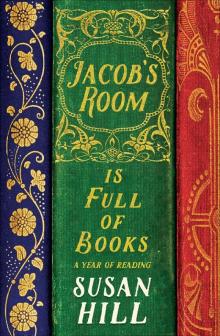 Jacob's Room Is Full of Books: A Year of Reading
Jacob's Room Is Full of Books: A Year of Reading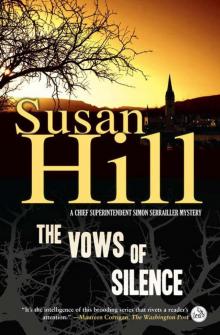 The Vows of Silence
The Vows of Silence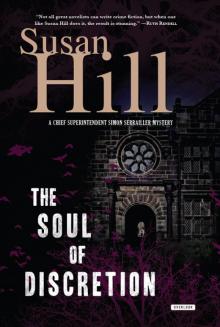 The Soul of Discretion
The Soul of Discretion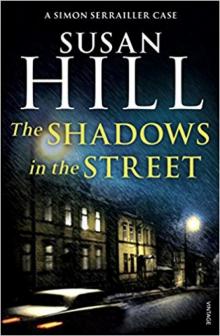 The Shadows in the Street
The Shadows in the Street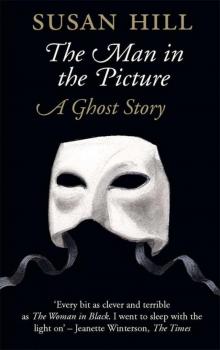 The Man in the Picture
The Man in the Picture Air and Angels
Air and Angels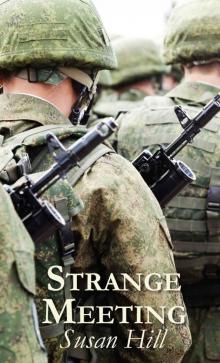 Strange Meeting
Strange Meeting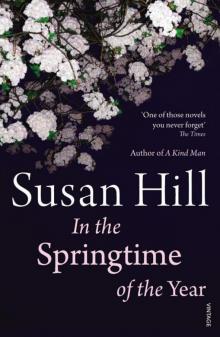 In the Springtime of the Year
In the Springtime of the Year Howards End Is on the Landing: A Year of Reading From Home
Howards End Is on the Landing: A Year of Reading From Home From the Heart
From the Heart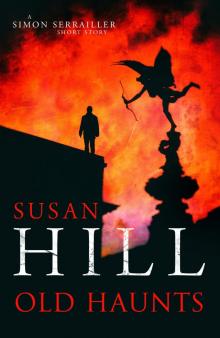 Old Haunts
Old Haunts The Mist in the Mirror
The Mist in the Mirror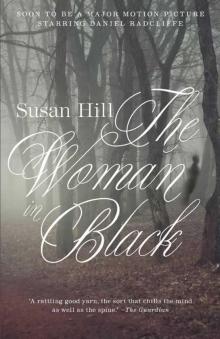 The Woman in Black: A Ghost Story
The Woman in Black: A Ghost Story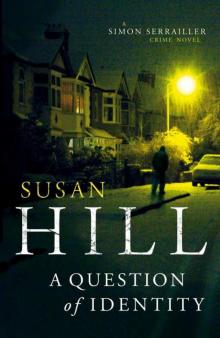 A Question of Identity (Simon Serrailler 7)
A Question of Identity (Simon Serrailler 7)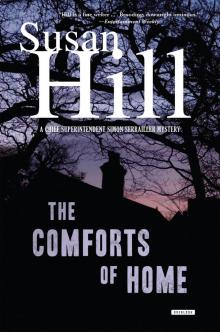 The Comforts of Home
The Comforts of Home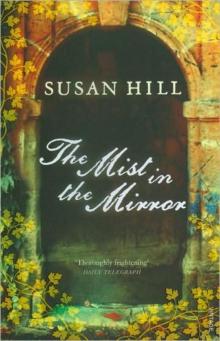 Mist in the Mirror
Mist in the Mirror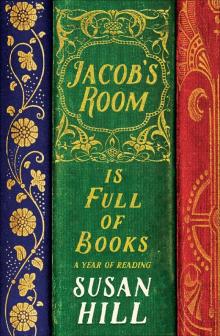 Jacob's Room is Full of Books
Jacob's Room is Full of Books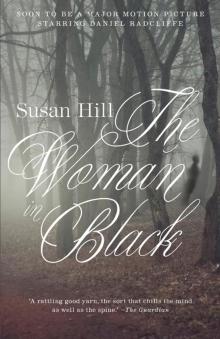 The Woman in Black
The Woman in Black Howards End is on the Landing
Howards End is on the Landing